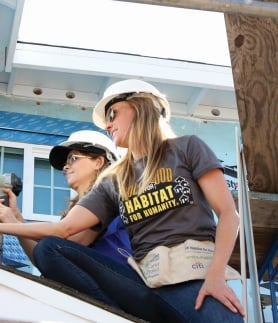At the time Yadira Flores was finishing her undergraduate work in psychology at York University and heading to Osgoode Hall Law School, her parents decided to start a family business. That decision gave Flores valuable business experience as the family searched for a location, negotiated the lease, created a supply chain and marketed the enterprise, amid other challenges.
This type of real-life business experience, with its customer-service component, says Flores, an associate in the business law department at Fogler, Rubinoff LLP, is somewhat analogous to the practice of law. “You don’t ever get to really turn it off in your mind, it’s always something you think about and that you care about.”
Fogler’s Myriah Graves, Director of Student Programs, initially interviewed Flores. She says the firm always starts by looking for students who have strong academics, which can be, but is not limited to, business academics. From there, she moves on to look for interesting work or volunteer experiences. “We’re looking for a well-rounded student who has some interesting work experience and/or volunteers within their community or school or for a not-for-profit organization.”
For example, says Graves, a lot of students these days are starting and running their own businesses while in law school. Students the firm has hired have run online businesses; these have been as varied as reselling textbooks or a personal concierge business that sourced Raptors tickets and helped organizations plan events.
As to volunteer initiatives, over the past several years Graves has definitely seen a difference in the “quality” of volunteer experience that students have on their résumés. Students she has spoken with have run programs to source and deliver food to low-income families, volunteered at an overseas orphanage, worked in community legal clinics assisting self-represented litigants or helped recent immigrants to understand the business and legal regulations as they set up small businesses.
Lynn Iding, Managing Director of Legal Professional Resources at McInnes Cooper in Halifax, says clients are increasingly demanding more of a full package from their lawyers. They want their lawyers to be trusted advisors who are responsive and timely and understand the business landscape, not only the legal landscape. “So when we are doing this competency-based assessment of candidates, we’re looking beyond just what mark did this person get in contract law, or do they have an undergraduate or graduate degree in business or commerce. We’re asking ‘do they have indicators of success in a broad range of competency areas?’”
One area of importance on a résumé is having attained client-service skills, says Iding. “It doesn’t have to be in a legal context,” she says. “If a student, for example, was a server in a restaurant or bar, they not only interacted with the public, there most probably were conflicts or delicate situations they had to handle. Having to exercise diplomacy and tact in jobs like the service industry speaks not only to client-service skills, but also to grit and determination.”
Kevin MacDonald, Chair of the Student Committee and Co-chair of the Financial Services Group at Vancouver’s Clark Wilson LLP, says as a business law firm, “we value candidates with a business background, be it practical work experience or a business academic background.”
However, the absence of a business background, he says, wouldn’t preclude a candidate who can demonstrate other strong characteristics and attributes, such as leadership, volunteerism and entrepreneurship. This includes a “demonstrated history of academic and other achievements that shows enthusiasm, a bounce in your step and the capability to handle hard work.” He wishes it were a harder science, but says, “when we’re evaluating the total package, a lot is still based on a gut feeling as to whether the person is a good fit.”
When Flores interviewed at Fogler, Rubinoff, her business experience shone on her résumé. Yet so too did her high marks and volunteer experience while in law school. This included volunteering for an international NGO under the supervision of a law school professor and co-founding a student-run Health Law Association, which, in turn, created a magazine, allowing her to collaborate with students, professors and administration.
Now five years out of law school, Flores says her background helps her be more comfortable when dealing with the firm’s partners and clients; in part, she is used to interacting with others on projects and moving files forward. As well, she says, “we all know this is a demanding profession in terms of your time, so learning early on how to use your time efficiently and still be able to participate in other things that you care about is very important to your happiness and your development as a lawyer.”
This type of real-life business experience, with its customer-service component, says Flores, an associate in the business law department at Fogler, Rubinoff LLP, is somewhat analogous to the practice of law. “You don’t ever get to really turn it off in your mind, it’s always something you think about and that you care about.”
Fogler’s Myriah Graves, Director of Student Programs, initially interviewed Flores. She says the firm always starts by looking for students who have strong academics, which can be, but is not limited to, business academics. From there, she moves on to look for interesting work or volunteer experiences. “We’re looking for a well-rounded student who has some interesting work experience and/or volunteers within their community or school or for a not-for-profit organization.”
For example, says Graves, a lot of students these days are starting and running their own businesses while in law school. Students the firm has hired have run online businesses; these have been as varied as reselling textbooks or a personal concierge business that sourced Raptors tickets and helped organizations plan events.
As to volunteer initiatives, over the past several years Graves has definitely seen a difference in the “quality” of volunteer experience that students have on their résumés. Students she has spoken with have run programs to source and deliver food to low-income families, volunteered at an overseas orphanage, worked in community legal clinics assisting self-represented litigants or helped recent immigrants to understand the business and legal regulations as they set up small businesses.
Lynn Iding, Managing Director of Legal Professional Resources at McInnes Cooper in Halifax, says clients are increasingly demanding more of a full package from their lawyers. They want their lawyers to be trusted advisors who are responsive and timely and understand the business landscape, not only the legal landscape. “So when we are doing this competency-based assessment of candidates, we’re looking beyond just what mark did this person get in contract law, or do they have an undergraduate or graduate degree in business or commerce. We’re asking ‘do they have indicators of success in a broad range of competency areas?’”
One area of importance on a résumé is having attained client-service skills, says Iding. “It doesn’t have to be in a legal context,” she says. “If a student, for example, was a server in a restaurant or bar, they not only interacted with the public, there most probably were conflicts or delicate situations they had to handle. Having to exercise diplomacy and tact in jobs like the service industry speaks not only to client-service skills, but also to grit and determination.”
Kevin MacDonald, Chair of the Student Committee and Co-chair of the Financial Services Group at Vancouver’s Clark Wilson LLP, says as a business law firm, “we value candidates with a business background, be it practical work experience or a business academic background.”
However, the absence of a business background, he says, wouldn’t preclude a candidate who can demonstrate other strong characteristics and attributes, such as leadership, volunteerism and entrepreneurship. This includes a “demonstrated history of academic and other achievements that shows enthusiasm, a bounce in your step and the capability to handle hard work.” He wishes it were a harder science, but says, “when we’re evaluating the total package, a lot is still based on a gut feeling as to whether the person is a good fit.”
When Flores interviewed at Fogler, Rubinoff, her business experience shone on her résumé. Yet so too did her high marks and volunteer experience while in law school. This included volunteering for an international NGO under the supervision of a law school professor and co-founding a student-run Health Law Association, which, in turn, created a magazine, allowing her to collaborate with students, professors and administration.
Now five years out of law school, Flores says her background helps her be more comfortable when dealing with the firm’s partners and clients; in part, she is used to interacting with others on projects and moving files forward. As well, she says, “we all know this is a demanding profession in terms of your time, so learning early on how to use your time efficiently and still be able to participate in other things that you care about is very important to your happiness and your development as a lawyer.”





